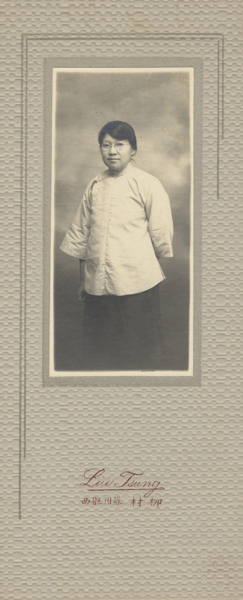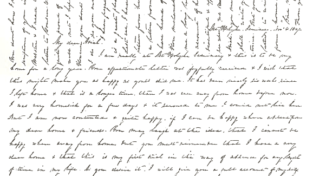Class Notes from Chi Nyok Wang, Class of 1916
One of the first two students from China to graduate from Mount Holyoke, Chi Nyok Wang, class of 1916, kept in touch with the College after she returned to Soochow (now Suzhou), China. Expanding the private high school that her mother had established, she held the position of principal until 1959. Through several decades, she shared news of the growth of her institution and recorded reunions with classmates. Chi Nyok was born in 1885 and died in 1967.
July 1919
Chi Nyok Wang has this year taken entire charge of Tsung Hwa School, a private school conducted in a part of her home. There are now about sixty pupils and ten teachers there. The financial problem is difficult, since pupils in China pay very little for board and tuition—not nearly enough to pay the expense for these. Both elementary and high school subjects are taught in the school. Chi Nyok Wang’s address is: Tsung Hwa School, 149 Zih Zien Street, Foomung, Soochow, China. She would very much like to hear from her college friends.
April 1926
Chi Nyok Wang is having a year’s leave of absence from Tsung Hua School, Soochow, China, of which she is in charge. She expects to be in New York this spring, but her mailing address while in this country is in the care of her sister, Dr. C. C. Wang, Michael Reese Hospital, 29th St. and Ellis Ave., Chicago, Ill.
July 1926
Chi Nyok Wang is returning to her work in China at the Tsung Hua School, Soo Choo at the end of the summer.
May 1931
Chi Nyok Wang, in January, wrote from Tsung Hua School in Soochow, China, to a classmate: “You Christmas letter with a check of $50 was quite a surprise to me. I never dreamed you would give such a gift from the class. It makes me rather ashamed, because I have never done anything for the class as a whole, then my work so far does not seem to deserve such a gift either. You are, indeed, too good to think of our need so far away and to take the trouble to make all the classmates agree on this contribution, while money, I know, at this period is of great demand even in the States. Now it only makes all of us here appreciate this gift most deeply and it gives us more courage to work still harder. I wish to thank you most heartily in the name of all. Thank you for all the news, too.
I am sure you want to know what we are going to use it for. It is to be the first gift toward our big gymnasium fund which is to be raised in the near future. The school has been growing in every way. We feel very grateful, in spite of the politic disturbances going on all this years, Tsung Hua has not been much affected. On the contrary, she has been growing steadily both in size and in reputation. A small new library building has been promised by a friend of the school. It will be in existence before this year ends. So we feel now the next greatest need is a good gymnasium. It has been roughly planned and calculated. The necessary sum will be around $20,000 mex. Gold is very high just now, and your $50 G. gives us 217.52 mex. So it is a good start. We shall always be very grateful to you.
We feel very proud of our graduates: most of them going to college. Even those, for some reason not able to go to college, have proved to be efficient teachers in various primary schools or in some other occupation; hardly any one ever going back home doing nothing. One of our graduates, who has just been through with college, might come to Holyoke for graduate work this fall. She will be the first daughter from Tsung Hua to Mount Holyoke. I hope she will have a chance to meet some of my friends of 1916.
I wish I could tell you more about the school which we hope will in a few more years grow to be a college and be adopted by Mount Holyoke as a daughter.
I am glad things in China begin to be brightened. Right here in Soochow streets being widened, living conditions being bettered, popular education being emphasized, public school conditions being improved. Thus the better days for China are coming; all her friends, I am sure, will feel happy with her”
August 1935
Chi Nyok Wang, principal of the Tsung Hua School for Girls in Soochow, China, has begun a campaign for a building fund for her primary school to be built on land acquired next to the Middle School. She expects to have the building finished in the fall. The school has steadily increased in numbers notwithstanding all the disturbances in China. Miss Wang was ill for two months in the winter but is recovered now. Her mother, one of the most progressive women of China, passed away during the year. Up to the last she was interested in the Women’s Club of Soochow which she started some years ago. She sent her three daughters to America to be educated and her granddaughter, I-Djen Ho, who received her M.A. in chemistry at Mount Holyoke in ’33.
May 1949
Jean Gordon Stowe entertained at her home in Concord, Mass., 12 members of 1916 from greater Boston at a delightful tea in honor of Chi Nyok Wang, her weekend guest. Chi Nyok spoke most interestingly about the conditions in China and about the Chinese Christian school in Soochow of which she is principal. Though modest about her own accomplishments it was evident to all that she has done a remarkable work. The school has over 1000 students and 30 buildings. Following the Japanese invasion Chi Nyok was obliged to become a refugee for eight years. In spite of that she retains the merry smile and charming manner we remember from college days and we all agreed she had changed less than any of us. She is studying at Teachers C., Columbia University and at the U. of Chicago for the current year.
Summer 1957
Yan Tsit Law writes, “Chi Nyok Wang did some wonderful work in establishing her mother’s school in Soochow, but since the Communist regime, I have not heard from her.”
Read more class notes from alumnae through the years.
July 14, 2017











Leave a Reply